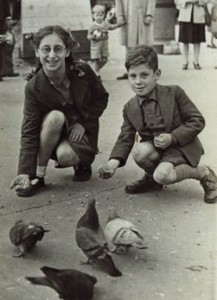
When I was a child, my grandfather took me to London’s Trafalgar Square to feed the pigeons. Thousands of these statue-splotchers covered the square, feeding on seeds offered by the outstretched hands of excited tourists. It must have been a favorite outing, because he also took my mother and her cousin (left) out for a similar thrill when they were children. The seemingly innocent act was outlawed in 2003 by London’s then-mayor Ken Livingstone, who cited £140,000 worth of dropping-induced damage to Nelson’s Column. It turns out that it’s not just the long-dead Nelson who has reason to fear the pigeons: Spanish researchers at the Animal Health Research Center in Madrid have discovered that feral pigeons carry several nasty pathogens, including two that cause diarrhea in humans.
I have nothing against pigeons personally: I realize that these resourceful birds have many unusual talents, including an ability to distinguish between the paintings of Monet and Picasso. Nevertheless, I intend to give them a wide berth from now on. Fernando Esperón and his team of intrepid pigeon-trappers have found that the birds carry high loads of Campylobacter jejuni, a bacterial species that can cause acute diarrhea in humans, and Chlamydophila psittaci, a respiratory and gastrointestinal bacterial infection that can also jump to humans.
Esperón and his band fanned out to public parks and gardens in Madrid, armed with gun-propelled nets, and captured a total of 118 pigeons. They extracted blood and “cloacal content samples,” (i.e. pigeon poop) from each individual pigeon, using “standard humane practice designed to minimize stress.” They detected the “extremely high prevalence” of C. psittaci and C. jejuni: 52 percent of birds were infected with C. psittaci, and 69 percent carried C. jejuni.
As it happens, none of the birds showed any signs of clinical disease, but pigeons do shed the pathogens in their excrement and, in the case of C. psittaci, in secretions from their eyes and nostrils. These pigeons “may therefore pose a public health risk to the human population,” Esperón says. Campylobacter species are the primary pathogens responsible for acute diarrhea in the world, and in countries such as England, Canada, Australia and New Zealand, C. jejuni causes more cases of diarrhea than Salmonella. Pigeon lovers everywhere: you have been warned.
Photo courtesy of Irene Glausiusz
I’m ambivalent about them too. They do unspeakable things to my car, from a great height, when it’s parked in the drive under a tree; but they are also a source of entertainment. They’re the only birds I’ve seen that are capable of falling off things.
In the Pays Basques, it’s a local sport in the autumn to net them at the heads of valleys. Competing valleys publish statistics, running into thousands per day, in the local papers. I’m not sure whether to find this barbaric or hilarious.
Pigeons are actually quite bright (for birds) and they are certainly resourceful. If you want to see some delightful images of pigeons, check out “Extraordinary Pigeons,” by Stephen Green-Armytage, which contains some really weird-looking birds as well as strange pigeon facts (a homing pigeon brought the news of victory at Waterloo to Britain.)
Last word on pigeons – graffito seen in London, c 1990 – “Keep Britain tidy – eat pigeon”.
Which reminds me that my great great grandfather had to bake a pigeon pie for his test to pass his apprenticeship as a baker (back around 1820 or so)
I have a real fear of pigeons – almost a phobia. I do everything to avoid them on the streets. If I see a pigeon, I’ll cross the street to avoid it. I won’t walk under bridges or places where pigeons sit. I am scared of them flying into me as I feel they are full of bacteria. They also have this freaky void in their eyes and are the most clueless animals. I am trying to overcome this deep fear by walking past them and staying calm but it is a difficult task to do. I also have recurring dream of them dropping poop on me. Does anyone have this same fear?
Dear Pigeon-Non-Fancier,
Not being a psychologist I cannot tell you whether others share your fear of pigeons, but from the way you describe your deep fear it sounds to me as if you could benefit from cognitive-behavioral therapy. There are well-recognized techniques, called systematic desensitization, which can help you confront and deal with such fears. I have used cognitive behavioral therapy myself and can tell you that it is very effective. To learn more about it, see http://phobias.about.com/od/phobiaslist/a/ornithophobia.htm. Good luck.
Awwww, I love pigeons but I didn’t have the chance to hold them. Now I look at them with new light and I’m not so sure now if I will still love them although they look so adorable.